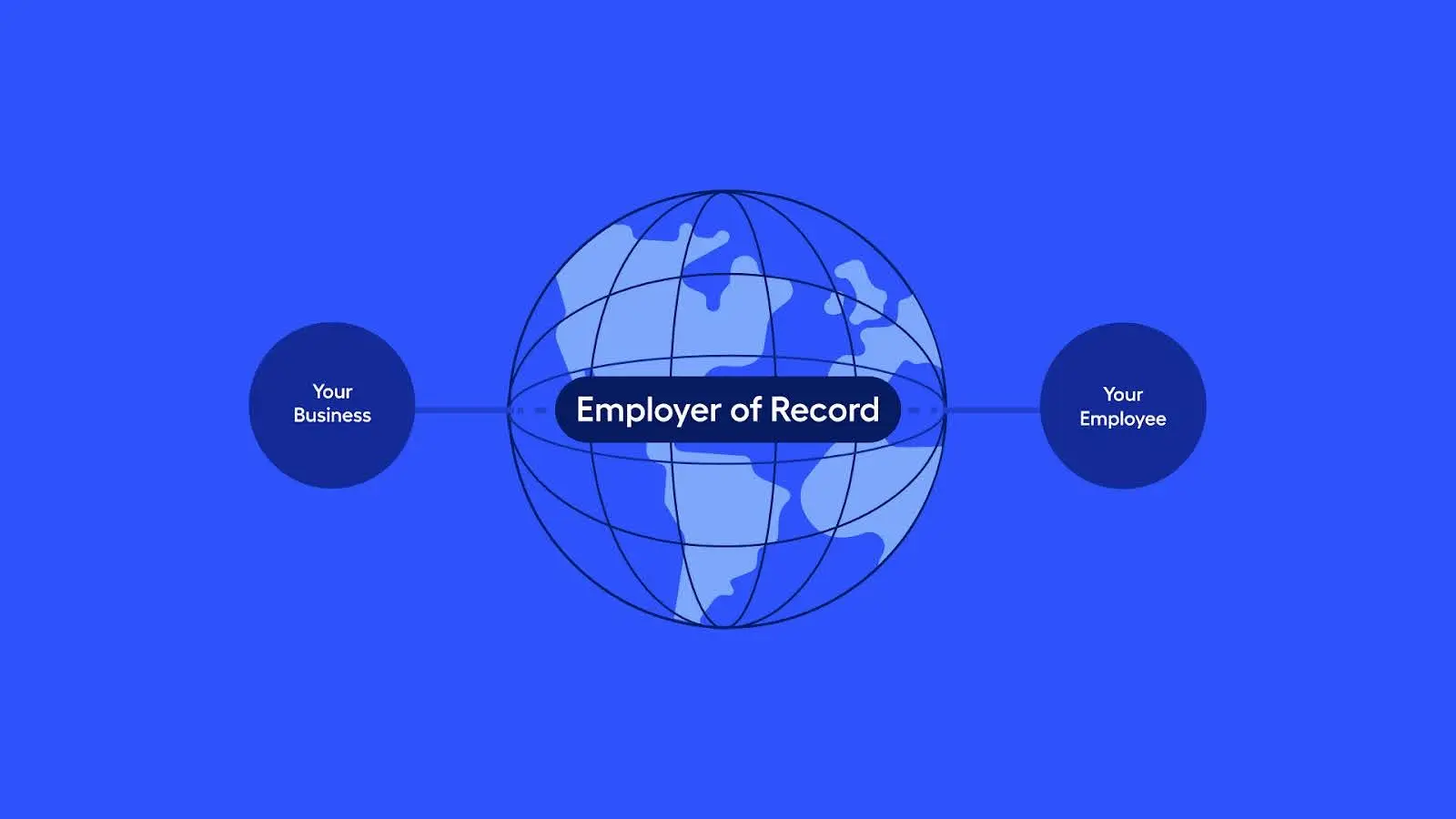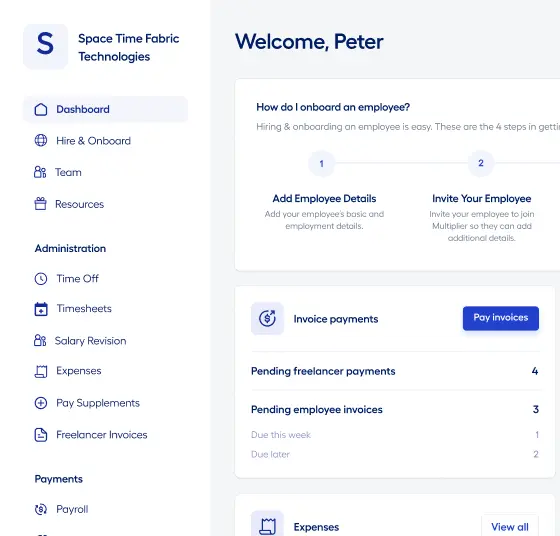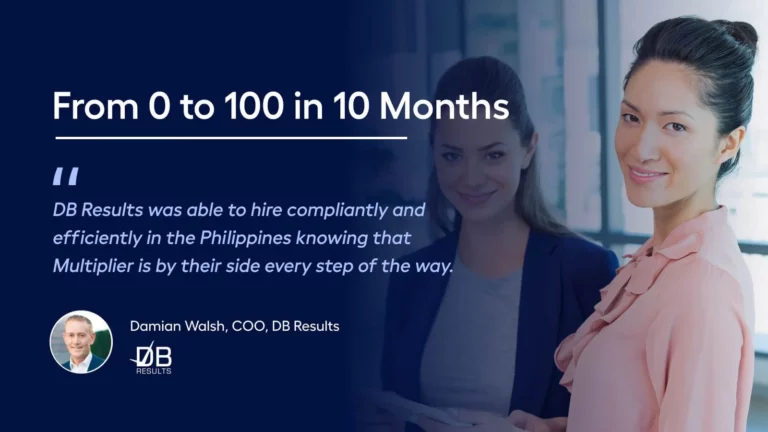The world of human resources and workforce management is evolving rapidly, and businesses need to find innovative solutions to stay ahead of the game. One such solution that has been gaining popularity among HR professionals is the Employer of Record (EOR) service. EOR services provide an efficient, flexible, and cost-effective way to manage employee contracts, payroll, compliance, and HR tasks.
This blog will explore what an Employer of Record is and how it differs from a PEO or a staffing agency. We will also examine how EOR services work and highlight their benefits and risks while clarifying the legal and tax implications of EOR services.
Let’s get started.
What is an Employer of Record (EOR)?
An Employer of Record (EOR) is a third-party organization that serves as the legal employer for employees on behalf of another company. EORs can be situated within the same country as the business they represent or in a different country with distinct employment regulations. The EOR assumes all responsibility for payroll, taxes, benefits, compliance, and HR tasks.
The employer continues to manage the employees’ day-to-day activities, such as job duties, performance, and work schedules. The employer of record industry has gained relevance in HR and workforce management solutions as businesses search for innovative ways to manage their workforce. Key reasons for the rise of EOR services include:
- Remote work: With the rise of remote workforces, EORs are becoming essential for providing seamless HR functionality. EORs can manage various HR tasks, allowing companies to focus on their core operations.
- Simplified onboarding and offboarding: EORs simplify the onboarding and offboarding process, making it easier for companies to manage their workforce.
- Legal and HR obligations: EORs assume the legal and HR obligations related to recruitment, compensation, and overall management of employees.
- Global workforce management: For companies managing a global workforce, using an EOR can provide several benefits, including handling local compliance, payroll, taxes, and stock options that vary by market.
- Handling global HR functions: EORs manage critical global HR functions, including global payroll, employee benefits, and employment.
- International expansion: An EOR enables companies to hire overseas and expand globally without having a local entity, streamlining international employment processes.
- Focus on core operations: With EOR services handling complex HR tasks, businesses can focus on their core operations and growth strategies.
What’s the difference between EOR, PEO, and staffing agency services?
| Employer of Record (EOR) | Professional Employer Organization (PEO) | Staffing Agency | |
| Definition | The EOR acts as the official employer and is responsible for hiring, managing HR and payroll, and ensuring legal compliance. | A PEO collaborates with companies to manage HR tasks, resulting in shared legal responsibility for the employees. | A staffing agency specializes in sourcing and placing employees for short-term assignments or specific projects at client companies. |
| Responsibility | The EOR takes on full responsibility for ensuring employment compliance, managing tax obligations, and handling payroll matters. | The PEO shares employment compliance, tax, and payroll responsibilities with the client company. | The staffing agency recruits, hires, and pays temporary workers. |
| Control | The client company retains authority over its employees’ day-to-day tasks and responsibilities. | The client company maintains control over day-to-day tasks and responsibilities while also collaborating with the PEO for HR management. | The client company holds authority over the tasks and responsibilities assigned to the temporary workers. |
| Best For | Companies expanding globally or in complex regulatory environments. | Small to mid-sized businesses looking for help with HR tasks. | Companies that need temporary or project-based staff. |
How Does an Employer of Record Work?
Once a company engages an Employer of Record service provider, the EOR assumes the role of the legal employer of the employees. The EOR then takes over payroll processing, tax withholding, benefits administration, and other HR tasks. However, the employer remains responsible for the day-to-day management of the employees, such as job responsibilities, performance, and work schedules.
The EOR acts as a partner to the employer and provides support and guidance on compliance and employment issues. The EOR ensures that all necessary taxes and employee benefits are paid and that the employer is compliant with all regulations.
At Multiplier, our EOR platform provides our clients with a hassle-free way to manage their workforce. Our technology streamlines the employment process by automating onboarding tasks and ensuring compliance with local laws and regulations. We also provide payroll processing, benefits administration, and HR support. This frees our clients to focus on scaling their business without having to worry about the complexities of international employment.
Risks and Benefits in an EOR
As with any business solution, there are risks and benefits to using an EOR service. One potential benefit is that EOR services can reduce administrative burdens, providing cost savings and allowing businesses to focus on core objectives. EOR services can also provide access to a global talent pool, enabling businesses to tap into diverse skills and expertise. Additionally, EOR services can help businesses avoid legal pitfalls, reduce compliance risks, and minimize the risk of legal disputes.
Although there are numerous advantages to using an Employer of Record, it is important to acknowledge the associated risks. One primary concern is the potential loss of control over certain operational aspects, as the EOR assumes legal employment and manages HR functions. Moreover, there’s a risk of encountering complications with crucial processes such as payroll and compliance, which can prove troublesome if the EOR fails to fulfill its obligations.
The quality of service varies greatly between EOR providers, which can lead to inconsistent employee experiences across different regions. However, at Multiplier, we’re committed to mitigating these risks and maximizing the benefits of our EOR solution. We take pride in our transparent and efficient processes and are confident in our ability to help our clients simplify their employment needs.
Key benefits of using an EOR
- Simplified global expansion: An EOR simplifies your business expansion by handling all HR-related tasks, allowing you to focus on core business operations.
- Quick integration and safe hiring: EOR services help in quick integration with new markets and speedy, safe hiring of talents without needing to establish a local entity.
- Business growth: An EOR can help expand your business by adding personnel to your existing workforce. It’s especially suited for smaller businesses that need to scale quickly.
- Ensure regulatory compliance: One of the key benefits of an EOR is its role in ensuring adherence to employment regulations and local labor laws, thereby minimizing legal risks.
- Saves time and money: Working with an EOR can save time and money, particularly when expanding globally, as it eliminates the need to set up legal entities in each country.
- Outsource recruitment and employee management: An EOR enables businesses to outsource recruitment and employee management tasks, making it easier to manage a global workforce.
- Simplify administrative processes: An EOR simplifies administrative processes such as hiring, tax documentation, and payroll, reducing administrative burden.
- Avoid employee misclassification: Using an EOR helps avoid issues related to employee misclassification, as rules can vary from country to country.
Legal Implications in an EOR
Employer of Record (EOR) services are legal and widely used by companies looking to expand globally or employ remote staff in different countries. The EOR acts as the legal employer on behalf of the client company. Employer of Record responsibilities include payroll, tax compliance, and adherence to local labor laws.
However, there are certain legal pitfalls that organizations need to be aware of, such as the potential for misinterpretation of employment laws, which differ from country to country. For this reason, EOR providers, like Multiplier, are expected to be well-versed with local labor laws and regulations of each country they operate in to ensure compliance.
Another common concern pertains to liability. While an EOR reduces a company’s liability by assuming legal obligations, it doesn’t eliminate it completely. The client company may still bear some responsibility in certain situations.
Despite these concerns, leading and reliable EORs offer a vital service for companies seeking to expand their operations globally, mitigating many of the risks associated with international employment.
Employer of Record Tax Implications
Employing an Employer of Record (EOR) carries notable tax implications for businesses. Primarily, the EOR shoulders the responsibility of withholding and remitting income taxes on behalf of the employee, alleviating the administrative burden for companies. Additionally, they oversee tax registration, a critical aspect when engaging an international workforce.
Additionally, through their deep understanding of local, state, and federal tax regulations, EORs can provide invaluable guidance to businesses in properly classifying remote workers, effectively sidestepping potential tax complications. As EORs assume the responsibility of submitting taxes, reports, and other documentation to the relevant agencies, they effectively shoulder the burden of compliance, thereby minimizing cross-border tax risks.
It’s worth noting that although an EOR can alleviate tax liabilities and streamline administrative tasks, it doesn’t completely eradicate a company’s risk. It’s crucial for companies to adhere to the relevant tax laws and regulations in the countries they operate in.
Employer of Record Agreement and Templates
An Employer of Record agreement is comprehensive and covers a wide range of topics to ensure both parties understand their responsibilities and expectations. Here are some key components that are usually included in such an agreement:
- Scope of services: This section outlines the specific services the EOR will provide. This often includes payroll administration, tax withholding, benefits administration, compliance with local employment laws, etc.
- Duties and responsibilities: Detailed descriptions of Employer of Record responsibilities as well as the client company. It should clearly state who is responsible for what to prevent misunderstandings and disputes.
- Fees and payment terms: This outlines the costs of the EOR’s services, how these fees are calculated, and the payment schedule.
- Term and termination: The duration of the contract and conditions under which either party can terminate the agreement.
- Liability and indemnity: This covers who is responsible in case of legal issues or disputes and to what extent each party is liable.
- Confidentiality: This details how both parties will protect sensitive information, including employee data, business strategies, etc.
- Dispute resolution: This outlines the process for resolving any disagreements or conflicts that may arise during the term of the agreement.
- Governing law: The agreement should specify which jurisdiction’s law will govern the contract.
Remember, it’s crucial for businesses to thoroughly review and understand all aspects of an EOR agreement before signing. Legal counsel can be invaluable in this process to ensure that all potential issues are addressed.
Exploring Alternatives to Employing an EOR
In-House EOR
- Control: Direct oversight of HR processes, policies, and procedures.
- Customization: Ability to tailor HR services to specific needs.
- Integration: Enhanced alignment with company culture and values.
- Cost: High initial and ongoing expenses for staffing, systems, and compliance.
- Complexity: Managing payroll, taxes, and legal compliance across regions can be intricate and laborious.
- Risk Exposure: Potential legal risks due to non-compliance with local labor laws.
Third-Party EOR
- Expertise: Access to extensive knowledge of local labor laws, tax regulations, and HR practices.
- Efficiency: Administrative tasks like payroll and tax filings are handled externally, freeing up company resources.
- Cost Savings: Generally more cost-effective due to economies of scale and existing infrastructures.
- Less Control: Reduced influence over HR operations.
- Dependency: Reliance on the EOR’s ability to deliver promised services.
- Cultural Fit: Potential challenges in aligning with company culture.
Employer of Record in Various Industries
Employer of Record services provides a multitude of advantages to businesses across a wide range of industries. Every business and industry has unique requirements. Employers of Record services can provide the flexibility, efficiency, and peace of mind to accomplish diverse goals while aiding expansion. Let’s explore how EOR can prove beneficial in specific industry contexts:
1. Technology
Tech companies often need to hire specialized talent from different parts of the world. An EOR can streamline the hiring process, ensuring compliance with local labor laws and managing payroll and benefits. This allows tech firms to focus on innovation and product development.
2. Healthcare
The healthcare industry continually faces a shortage of skilled professionals, often in critical circumstances. EOR services can enable healthcare providers to tap into global talent pools, handling all administrative tasks associated with international hiring, such as visa processing, payroll, and tax compliance.
3. Manufacturing
Manufacturing companies with operations in multiple countries can use EOR services to manage their international workforce more efficiently. An EOR can handle HR tasks, freeing up the manufacturing company to focus on production, quality control, and logistics.
4. Retail
Retailers expanding into new markets can benefit from EOR services. An Employer of Record can manage employment contracts, ensure compliance with local labor laws, and handle payroll and benefits, allowing the retailer to focus on establishing and growing their presence in the new market.
5. Consulting
Consulting firms often need to deploy staff to client sites in different countries. An EOR can manage the complexities of international employment, including local compliance, payroll, and benefits, enabling the consulting firm to focus on delivering value to its clients.
6. Non-profit
Non-profit organizations operating in multiple countries can use EOR services to manage their international workforce. An EOR can ensure compliance with local labor laws, handle HR tasks, and manage payroll and benefits, allowing the non-profit to focus on its mission.
These are just a few examples. Any industry that hires internationally or has a global workforce can potentially benefit from Employer of Record services. By leveraging EOR services, organizations access a streamlined and compliant employment solution that handles payroll, benefits, and legal requirements. This allows businesses to focus on their core operations while ensuring smooth and efficient international workforce management.
Whether it’s expanding into new markets or simplifying global HR operations, EOR services offer a strategic advantage for companies operating in today’s interconnected world.
Grow and diversify your workforce with Multiplier
EOR services provide a flexible and cost-effective way for businesses to manage their employees. By partnering with a trusted EOR service provider, businesses can reduce administrative burdens, access a global talent pool, simplify tax compliance, and minimize legal risks. Although there may be risks associated with using an EOR service, they can be mitigated through the careful selection of a reputable EOR service provider and thorough EOR agreements.
At Multiplier, we are passionate about creating a world where businesses can focus on their growth without having to worry about the complexities of international employment. Do you want to know more about how an Employer of Record can grow your business? Talk to our experts.
FAQs
Q. What is the role of an Employer of Record?
An Employer of Record (EOR) is a third-party organization that handles the administrative, HR, and legal aspects of hiring and employing staff. They take on responsibilities such as payroll, benefits administration, tax compliance, and adherence to local labor laws.
Q. How can I find a reputable EOR provider?
Finding a reputable EOR provider involves conducting thorough research. Look for providers with a strong track record, positive client testimonials, and extensive experience in the countries you’re targeting.
Q. Can EOR services be customized for my industry?
Yes, EOR services can often be customized to suit specific industry requirements. A good EOR provider will understand the nuances of different industries and adjust their services accordingly, whether it’s technology, healthcare, manufacturing, retail, consulting, or non-profit sectors.
Q. How does EOR differ from traditional employment?
Traditional employment involves a company directly hiring and managing all aspects of an employee’s work life, including payroll, taxation, and benefits. In contrast, an EOR takes on these responsibilities, freeing up the company to focus on its core business operations.
Q. What should I include in an EOR agreement?
An EOR agreement should clearly outline the responsibilities of both parties. It typically includes details about payroll management, employee benefits, tax compliance, termination procedures, and dispute resolution. It should also specify which party is responsible for employment liabilities.
Q. Is EOR suitable for startups and small businesses?
Absolutely. EORs are particularly beneficial for startups and small businesses as they allow these companies to quickly tap into global talent pools without the need to navigate complex foreign employment laws or set up foreign entities. They can also help manage costs by handling HR tasks more cost-effectively than maintaining an in-house team.
Q. What industries benefit the most from EOR services?
While EOR services can benefit nearly any industry, they are especially advantageous for sectors like technology, healthcare, manufacturing, retail, consulting, and non-profit. These industries often require specialized talent that may not be readily available domestically, making international hiring a necessity.
Q. Can you onboard contractors through an EOR?
Absolutely! An Employer of Record (EOR) can be a powerful tool for companies looking to expand their teams with contractors, especially on an international scale. Handling various aspects of compliance, taxation, and employment law, an EOR simplifies the process of bringing on contractors from around the globe. This method allows businesses to engage top talent from different regions without the complex administrative burden that typically comes with global hiring.
EORs effectively manage the contractual relationships between your company and your contractors, ensuring all local employment regulations are adhered to. This setup not only speeds up the hiring process but also provides a layer of legal security and operational ease, making it an ideal solution for businesses aiming to scale quickly and efficiently across different countries.
For more detailed insights into leveraging an EOR for hiring international contractors, platforms like Multiplier provide comprehensive resources and support to streamline your contractor management process.
Q. How much does an EOR typically cost?
- Location: The country or region where your employees are based can significantly affect costs. This is due to varying local legal and compliance requirements which the EOR must adhere to.
- Services Provided: EORs offer a range of services like payroll, taxation, and compliance management. More comprehensive service packages may increase the cost.
- Number of Employees: Generally, EORs charge based on the number of employees you need to onboard. The charges per employee might decrease as the number of employees increases, due to economies of scale.







